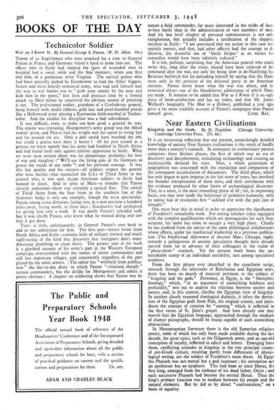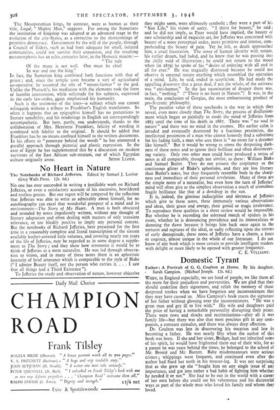Near Eastern Civilisations
IT is an interesting reflection that our present, astonishingly detailed knowledge of ancient Near Eastern civilisations is-the result of hardly more than a century's research. In retrospect its evolutionary pattern comprises three distinct phases, the first of which was an era _of discovery and decipherment, stimulating archaeology and creating an inexhaustible demand for texts. Next, a whole generation:of epigraphists was concerned with the translation and comparison of the consequent accumulation of documents: The third phase, which has only begun to gain impetus in the last score of years, has involved the broader interpretation of these texts, and their correlation With the evidence produced by other forms of archaeological discovery. This, in a sense, is the most rewarding phase of all ; for, in improving ,focus, one may now study the behaviour of primitive humanity, with its native Mk of. resolution first " sicklied o'er with the pale cast of thought."
One must bear this in mind in order to appreciate the significance of Frankfort's remarkable work. For among scholars today equipped with the complex qualifications which are prerequisites for such finer scrutiny, his name has come to occupy a very high place. Clearly he has profited from the advice of the same philological collaborators whose efforts, under his intellectual leadership in a previous publica- tion (The Intellectual Adventure of Ancient Man; • Chicago, 1946), towards a palingenesis of ancient speculative thought have already carried them far in advance of their colleagues in the realm of " phase-three " research. Yet the present work bears the un- mistakable stamp of an individual sensibility, rare among specialised scientists.
From the first phrase ever identified in the cuneiform script, onwards through the labyrinths of Babylonian and Egyptian texts, there has been no dearth of material pertinent to the subject of "kingship and the gods." Foremost, in Egypt, is the " Memphite theology," which, "in an argument of astonishing boldness and profundity," sets out to analyse the relations between society and nature, and, in this context, clarifies the Egyptian view of kingship. In another closely reasoned theological dialectic, it infers the deriva- tion of the Egyptian gods from Ptah, the original creator, and intro- duces the concept of creation by " naming " which is reflected in the first verses of St. John's gospel. And here already one May marvel that the Egyptian language, approached through the medium of clumsy pictographs, should be found capable of such astonishing abstractions.
In Mesopotamian literature there is the old Sumerian religkius poetry, some of which has only been made available during the last decade, the great epics, such as the Gilgamesh poem, and an age-old conception of royalty, reflected in edictt and letters. Emerging from these, conflicting attitudes to kingship in the two principal centres of pre-Greek culture, resulting partly from differences of physio- logical setting, are the subject of Frankfort's main thesis. In Egypt the Pharaoh was not mortal but a god incarnate ; his coronation not an apotheosis but an epiphany. This had been so since Horus, the first king, emerged from the embrace of his dead father, Osiris ; and each successive Pharaoh had become the eternal Horns. Thus the king's primary function was to mediate between his people and the natural elements. But he did so by direct "confrontation," on a basis of equality.
The Mesopotamian kings, by contrast, were as human as their title, Lugal, "Mighty Man," suggests. For among the Sumerians the institution of kingship was adopted at an advanced stage in the evolution of the city-States, as a corrective to the shortcomings of primitive democracy. Government by the will of the people, through a Council of Elders, such as had been adequate for small, isolated communities, could not survive their expansion, and the resulting metamorphosis has an echo, centuries later, in the Homeric maxim:— "The rule
Of the many is not well. One must be chief In war and one the king."
In fact, the Sumerian king combined both functions with that of priest ; and, since the temple soon became a sort of agricultural co-operative, he 'assumed the role of " tenant-farmer " to the god. Unlike the Pharaoh's, his mediation with the elements took the form of humble intercession, while solicitude for his subjects, expressed in the early law-codes, again emphasised his humanity.
Such is the testimony of the texts—a subject which one cannot relinquish without a tribute to Frankfort's English translations. So often it happens that an epigraphist himself has no pretentions to literary sensibility, and his renderings in English are correspondingly unsympathetic. But here, partly, one understands, thanks to the collaboration of Mrs. Henrietta Frankfort, felicity of wording is combined with fidelity to the original. It should be added that Frankfort has by no means confined himself to the written documents. In his efforts to "penetrate behind the words" he has attempted a parallel approach through pictorial and plastic expression. In the case of Egypt he has supplemented this by a discursion on modern" survivors of the East African sub-stratum, out of which Egyptian



































 Previous page
Previous page